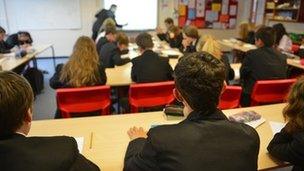Schools accused of anti-gay language in sex education
- Published

There are claims that some schools have sex education policies that do not show "equal respect"
Dozens of schools in England and Wales are accused of using language in sex education policies echoing the scrapped "Section 28" rules, which banned the promotion of homosexuality.
The British Humanist Association claims there are more than 40 schools with such sex education policies.
The controversial Section 28 legislation was abolished a decade ago.
A Department for Education spokesman said schools should not "promote any sexual orientation".
In Wales, the government says it will investigate the claims as a "matter of urgency."
But there were also challenges over some of the schools included in this list, with Newham council saying that the criticism of one of its local schools was "woefully unacceptable and inaccurate".
The British Humanist Association (BHA) says it has identified 19 schools which it claims appear to have sex education policies which "replicate" the language of Section 28, introduced in the late 1980s and repealed in 2003.
It says there are a further 22 schools which use language which it describes as "unhelpfully vague".
Policy withdrawn
This former legislation, opposed by gay rights campaigners, said that councils "shall not intentionally promote homosexuality or publish material with the intention of promoting homosexuality".
Wes Streeting of Stonewall said Section 28 had "devastating consequences"
"It is simply unacceptable that over a decade after the repeal of the pernicious Section 28 that these schools continue to enforce similar policies, while others have statements which are overly vague on this matter," said the BHA's Pavan Dhaliwal.
"All of the schools identified must urgently review their sex and relationships education policies to ensure that all pupils, whatever their sexual orientation or gender identity, are treated with equal respect and understanding and that homophobic and transphobic bullying is stamped out."
Among the schools identified was Colston's Girls' School in Bristol, which has now said it will withdraw the policy that the governing body "will not permit the promotion of homosexuality".
"The policy was immediately withdrawn and a replacement is currently being prepared which will be published on the school website in due course," said a spokeswoman for the school.
She said the school was committed to "an environment that promotes equality and respects and celebrates the diversity of all members of the school community".
The Crest academy group in north London was criticised for a policy that stated:"Academies and the Governing Body will not permit the promotion of homosexuality."
A spokeswoman for the group said that this had been an "oversight" that did not reflect the ethos of the academies and that policies would be updated by the new term.
Swindon Academy has now amended a policy which had stated: "Staff have a responsibility to engage in objective discussions on homosexuality but not to promote it."
A statement from United Learning, which is the academy's sponsor, said: "We abhor discrimination of any kind."
One of two schools in Wales on this list, Tasker Milward in Pembrokeshire, apologised for having "an old policy" referring to the defunct Section 28 regulations on its website.
There are also disputed accusations against schools based on claims that the language of policies might be misinterpreted.
Also included in the BHA's list of "high concern" schools is Hallsville primary school in Newham, east London, which it criticises for using the phrase: "There should be no direct promotion of sexual orientation."
A spokesman for the BHA said this could be misinterpreted as similar in language to Section 28, rather than a neutral position.
The primary school's sex education policy also specifies that "Homophobia should be challenged wherever and whenever it arises in schools."
A spokeswoman for Newham council said it was "woefully unacceptable and inaccurate" to include Hallsville in this list.
"Hallsville's sex education policy makes it clear that there should be no direct promotion of sexual orientation. This is in line with DfE guidance that school policies must not discriminate unfairly on grounds of sexual orientation or promote any sexual orientation."
A spokeswoman for the Department for Education said it would be "looking into these schools".
"What these schools have done by singling out homosexuality is unacceptable.
"All schools can draw up their own sex education policy but they must ensure they do not discriminate unfairly on grounds of sexual orientation.
"Our sex and relationship education guidance makes it clear that schools should not promote any sexual orientation."
- Published21 August 2013